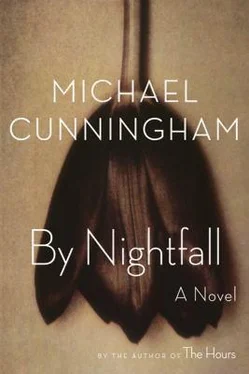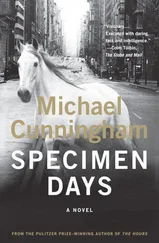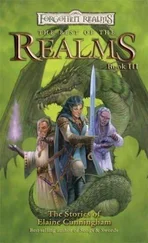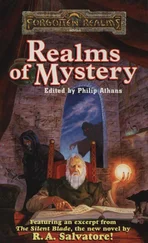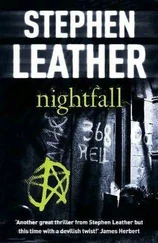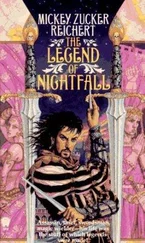Or, okay, maybe Peter is gay after all, and just wants to get off on the free porn.
Was that a long sigh from the far side of the wall, or a swell of music?
What would Mizzy’s fantasies be?
It’s impossible to imagine, isn’t it? Most men probably go through the same motions, more or less, but what’s in their minds, what agitates their blood? What could be more mortifyingly personal, what veers closer to the depths, than whatever it is that makes us come? If we knew, if we could see what’s in the cartoon balloons over other guys’ heads as they jerk off, would we be moved, or repelled?
Peter finds himself thinking of Joanna in the lake. Joanna was a fantasy mainstay for years, though she has, of course, been replaced for decades now by other women. The image of Joanna in the lake (she’s turning around, she’s unfastening the top of her bikini) is complicated by what she became, as witnessed by Peter on a trip to Milwaukee years ago: hale and handsome, cheerfully pushing forty with a wallet full of photos, a pretty and sturdy woman with no hint of sex about her. Peter’s vision of her seems to include Matthew as well, Matthew at the lake, in his pale blue trunks, though Matthew is complicated by what he became: dead. Peter is visited by a sense of annihilating fire. He is surprised to find it sexy—a blinding heat that wants to devour every part of you. Yeah, the cremation fire, but still. It’s a classic, isn’t it, it’s eternal, the Cyclops or wolf or witch that wants to eat you; it’s been frightening and titillating us forever, the entity that hungers for your body, that couldn’t care less about possession of your soul. We insist, of course, on punishing our predators; we stab out their eyes or fill their bellies with stones or push them into their own ovens, but they’re our favorite enemies, we fear and love them, why wouldn’t we, when they find us so delectable, when they care only for our flesh and give not one shit about our secret inner parts? Why do you think it’s a shark that made Damien Hirst’s career?
A virus ate Matthew. Time ate Joanna. What’s eating Peter?
He’s got a hard-on now. How weird is that? He passes through a moment of vertigo, a gut-flight over certain… possibilities. Come on, if he were gay he’d have known it, wouldn’t he? Still, he’s a man with an erection, an erection inspired by this particular boy, his wife in boy-drag, and he’s listening to the boy jerk off. Yeah, god help him, he’s aroused by Mizzy’s youth and Mizzy’s probable doom and he’s aroused (still, after all this time) by a single nanosecond’s glimpse, more than thirty years ago, of Joanna’s pale pink nipple as she readjusted her bathing suit, though that nipple is utterly changed by now; he’s aroused by the memory of having been young, of the slim but wiry hope that the briefest look at Joanna’s nipple promised an erotic future more abundant and transporting than he could fully imagine; he’s aroused (how weird is this?) by death’s patient eating of the living and by the sweetly determined young waitress at JoJo’s yesterday and by the strangeness of where he is and who he seems at this moment to be—the word “pervert” comes to mind, doesn’t it? (Surprise, it seems that maybe fetishists and other such get off on being fetishists; anyway, Peter, an amateur, finds it sexy that he’s doing something of which he really should be ashamed.) Queer for you, boy, alone in the world, as if you were a gender unto yourself. Peter has a dark tingling running through his blood, an intoxicating shot of embarrassment—finally, something illicit, something fucked up and wrong and for that very reason just the tiniest bit profound—and a moment later, when he hears the low groan that surely means Mizzy has come (Peter won’t come, he’s not that turned on, or can’t let himself be), he is briefly, terribly in love with Mizzy, with Mizzy himself and with the dying world, with the girl in the green leather jacket who stood before the shark and with the three witches who want to eat him (where did that come from, Macbeth?) and with Bea when she was two or maybe three, when she’d tumbled down some stairs and was not harmed but really and truly scared, and he’d held her and whispered to her until it was all right again, until he’d made it better.
After the fact, Peter passes through a wave of nausea over what it is he’s done—who does this make him, exactly? How can Mizzy, alone among the realm of men, excite him so? Is it possible to be gay for one man only?
What’s wrong with him? Has his whole fucking life been a lie?
Still, the bigger surprise for Peter is how tender he feels now, how strangely solicitous, toward Mizzy. Maybe it’s not, in the end, the virtues of others that so wrenches our hearts as it is the sense of almost unbearably poignant recognition when we see them at their most base, in their sorrow and gluttony and foolishness. You need the virtues, too— some sort of virtues—but we don’t care about Emma Bovary or Anna Karenina or Raskolnikov because they’re good. We care about them because they’re not admirable, because they’re us, and because great writers have forgiven them for it.
Mizzy has spent the afternoon in his sister’s fancy loft, getting high and beating off. And, yes, it’s more compelling to Peter than any determination to sit in a mountain garden, contemplating rocks. Now he can begin to love Mizzy, now that he no longer feels the need to protect or admire him.
There is (was, it’s past eleven now) a slightly awkward interlude when Rebecca got home, because Peter had to feign having been deeply asleep for hours, which implied faking an illness far more acute than the one he’s actually suffering, which meant just a bowl of soup for dinner, and no alcohol. (By the way, is the drinking becoming a problem, how exactly are we supposed to know?) The fact that Mizzy was clearly more than a little discomfited, as who wouldn’t be, suddenly learning that someone had been on the premises the whole time, even if he hadn’t bought drugs and masturbated… Peter gave what he hoped was a convincing portrayal of a man so brought down by a stomach bug that he’d been comatose, zeroed out, dead to the proverbial, and once he’d been resurrected by Rebecca he was like the ghost of Hamlet’s father, all doddering ephemerality, must have been the mayo in that turkey wrap, yes, he’ll have Uta call them first thing in the morning, right now it’s a cup of broth for the poor old wretch and then back to bed at, like, eight thirty, where he’ll continue to feign malediction (he feels almost entirely fine, by the way, the actual intestinal episode has subsided to its ordinary, ongoing condition of minor queasiness) while watching old episodes of Lost. On his way out of the room he takes a good short look at Mizzy, who does not seem entirely reassured; who sits at the table with a glass of wine looking so young and guilty and… what?… tragic, tragic in a way that’s available only to the young, the young and self-immolating (how is Peter going to tell Rebecca that Mizzy is using again?), anyone young enough, that is, to be going down ahead of the curve; it’s different entirely from the tragedies of age, even of middle age, when any hint of downfall is shaded by gravity, by wounds, by the simple, maddening failure to stay young. Youth is the only sexy tragedy. It’s James Dean jumping into his Porsche Spyder, it’s Marilyn heading off to bed.
By midnight Peter has been prone for so many hours as a faux convalescent he suspects he’s getting bedsores, which is, of course, ridiculous, but he may in fact be developing some subtle form of brain sores, it’s hard enough for him to take care of himself when he actually is sick; a half day of lying-in when he’s (relatively) healthy is pretty close to intolerable. Rebecca is asleep beside him now, Mizzy has retired to his room. Peter lies with his breathing wife. On the opposite side of the flimsy wall, Mizzy makes no sound of any kind. Peter wonders: Is Mizzy lying there in a similar state, wide awake but stock still, nervous about what Peter might have heard regardless of Peter’s insistence that he was deep-sixed? Peter briefly imagines them, Mizzy and himself, as two medieval tomb effigies, brothers in arms; if Mizzy looked earlier like an idealized, sculpted warrior, Peter now sees them both, laid in their sarcophagi side by side, safe as only the dead can be, the older and the younger man, fallen together in some battle fought on a piece of contested land that is now, in all likelihood, a parking lot or a strip mall, though he and Mizzy remain just as they were when the land was a prize beyond measure and the monks laid the two of them down, new members of eternity, inhabitants of a vanished world that was not easier than the current one but was neither shoddy nor tawdry; a world of woods and fens, sparsely peopled, in which men slashed and grappled and beat their shields over possession of turf that could still grow crops, of forests where gods and monsters still watched from the shadows. There’s something about Mizzy that suggests the Middle Ages, it’s that pallid, fine-boned prettiness, the sorrowful eyes, the sense (Peter can’t stop thinking about this) that he’s ephemeral, he’s the Mistake, he’s the ghost child who can’t attach to the world as firmly as most people do.
Читать дальше
Конец ознакомительного отрывка
Купить книгу
